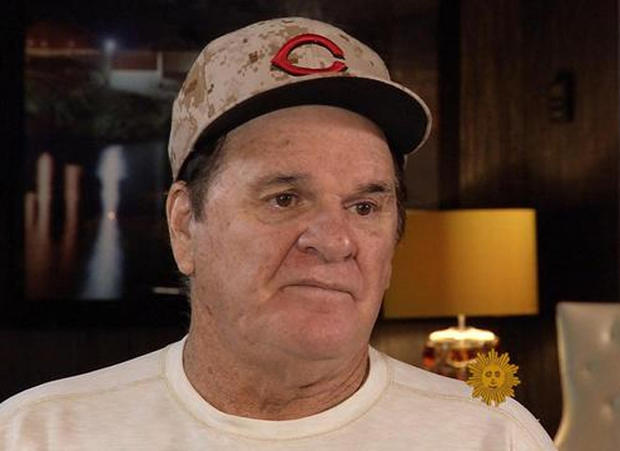Pete Rose denied reinstatement by MLB
CINCINNATI -- Baseball Commissioner Rob Manfred rejected Pete Rose's plea for reinstatement on Monday, citing his continued gambling and evidence that he bet on games when he was playing for the Cincinnati Reds.
Manfred said in a letter sent to Rose and made public that baseball's hits king hasn't been completely honest about his gambling on games. Manfred also noted that Rose continues to bet on baseball legally, even though his gambling got him into trouble.
After he accepted a lifetime ban in 1989, Rose saw a counselor who concluded he had a gambling problem and shouldn't make any bets. Rose continues to bet on sports including baseball, and it would be an "unacceptable risk" to let him back into the game, Manfred said.
The career hits leader agreed to the lifetime ban after an investigation commissioned by MLB concluded Rose bet on games involving the Reds while he managed and played for the team. The ban has prevented him from appearing on the Hall of Fame ballot.
Rose applied for reinstatement in September 1997 and met with Commissioner Bud Selig in November 2002, but Selig never ruled on Rose's application. Manfred succeeded Selig in January, and Rose again applied to end the ban. He met with Manfred on Sept. 24.
Now 74, Rose repeatedly denied betting on baseball until in his 2004 autobiography, "Pete Rose: My Prison Without Bars." He reversed his stand and acknowledged he bet on the Reds while managing Cincinnati.
At the time the ban agreement was announced, then-Commissioner A. Bartlett Giamatti said: "The burden is entirely on Mr. Rose to reconfigure his life in a way he deems appropriate."
Manfred said in his letter to Rose that the hits king has failed to meet that burden.
"In short, Mr. Rose has not presented credible evidence of a reconfigured life either by an honest acceptance by him of his wrongdoing, so clearly established in the Dowd Report, or by a rigorous, self-aware and sustained program of avoidance by him of all the circumstances that led to his permanent in eligibility in 1989," Manfred wrote.
The Hall of Fame's board of directors voted in 1991 to ban those on the permanently ineligible list from the Baseball Writers' Association of America ballot. Manfred said that's a separate issue. He also said he will consider allowing Rose to continue participating in on-field events related to baseball, as he did during the All-Star game in Cincinnati in July.
Rose has maintained that he only bet on games while serving as a manager but evidence has surfaced suggesting otherwise. According to ESPN, the incriminating documents are copies of pages from a notebook that were seized in 1989 during a raid of one of Rose's associates, about two months after Baseball Commissioner Bart Giamatti exiled Rose from baseball. The raid stemmed from a mail fraud investigation and was not related to Rose's gambling, ESPN reported.
As recently as April 23 of this year, Rose denied that he ever bet on baseball as a player, according to CBSSports.com.
When asked last year by CBS' Lee Cowan if he feels he will ever get into the Hall of Fame, Rose said yes.
"I don't know if I'm going to live to see it," Rose said. "Someone, at some period of time, will feel it in their heart to give me a second chance. I might be six feet under, but that's what you have to live with."
A 17-time All-Star, Rose was the 1963 NL Rookie of the Year, 1973 MVP and 1975 World Series MVP. A three-time NL batting champion, he had 4,256 hits from 1963-86, topping the mark of 4,191 set by Ty Cobb from 1905-28.
